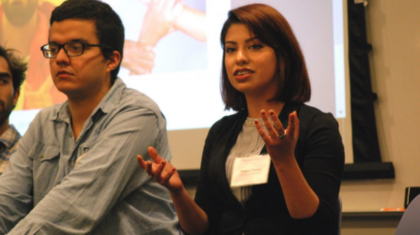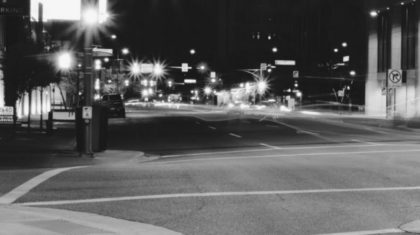
The draft update to Oakland, CA’s bicycle plan was released for public review and comment this month. The plan, called “Let’s Bike Oakland,” is part of a larger effort by the City of Oakland’s Department of Transportation (OakDOT) to practice equity-focused transportation planning.
Alta Planning + Design was selected to lead a diverse team of subject matter experts and community-based organizations as part of this community-driven project.
We caught up with project manager, Jeff Knowles, to learn more.
Q: What was Oakland’s goal in updating this bike master plan?
Jeff Knowles: OakDOT wanted an updated bicycle plan that accurately reflected and addressed the needs of its most vulnerable residents. This meant the planning process and plan outcomes would need to be truly equity-driven. While currently in draft, Let’s Bike Oakland attempts to achieve that goal.

Q: What was the approach to the plan?– A representative survey to learn about Oaklanders’ experience biking
– An Equity Framework to guide plan analysis, plan recommendations, and engagement
– New engagement strategies including partnering with community-based organization to reach underrepresented Oaklanders, host community workshops, and help guide the plan recommendations
– New outreach strategies including the use of a digital engagement tools and in-person mobile workshops to meet people where they’re at, across the city
Q: What were some of the obstacles and opportunities?
Jeff Knowles: A long history of distrust and disinvestment combined with rapidly increasing housing costs, fear of displacement, and cultural erasure through gentrification meant that residents living in Oakland’s disadvantaged neighborhoods were skeptical of new infrastructure investments in their community. The question “who is this plan for?” was a concern that framed nearly every engagement event.
OakDOT could have conducted more traditional public engagement, but instead decided to engage more authentically with specific communities and share its decision-making power with residents. To set the tenor of the project, staff and consultants were invited to attend an anti-racism training led by Oakland’s Department of Race and Equity. The project team then worked to develop an equity framework to guide the project that focused on accessibility, health and safety, affordability, and transparency. The framework developed metrics to answer questions such as:
- Who are the City’s most vulnerable groups?
- Does the plan address barriers so that vulnerable populations can take part in or enjoy the improvements?
- Does the plan help support and not impede public transit service?
- Does the plan increase access to jobs, education, health care, and other destinations?
- Does the plan help reduce the burden of household transportation costs?
- Will the plan help address discrimination or racially-biased policing?
- Do vulnerable people have confidence that government will build what they ask for?
Q: Who were the key partners in making this vision a reality?
Jeff Knowles: The City hired five community-based organizations to host and facilitate several rounds of community conversations. OakDOT staff and consultants were tasked with developing materials, sharing information, and above all, listening.
Community Partners
Consultant Partners


Q: How did Alta listen to community partners?
Jeff Knowles: Through our partner conversations and over the course of 53 community events, it became evident how important it is that the plan respect and celebrate existing bicycling cultures in Oakland. Partners like Cycles of Change and the Scraper Bike Team have deep roots in East Oakland and have spent years creating a supportive and safe space where residents — mostly youth— can gain access to bikes, learn how to maintain their bike, and bike safely with their peers.
For every policy action, program idea, and infrastructure strategy, the plan shares what we heard from the community and how that information led to the proposed investment. Residents valued straightforward solutions like fixing potholes, funding more community-led rides, and expanding bicycle safety education to every student in Oakland.
Q: How was the community able to get involved in this process?
Jeff Knowles: Three rounds of listening sessions and community workshops were held in East and West Oakland by community partners. Additionally, OakDOT and consultants hosted over 20 mobile workshops at libraries, parks, and farmer’s markets and community events like the Malcolm X Jazz Festival, Oakland First Fridays, Oaktoberfest, and the 18th Annual Art + Soul Festival. Community members also engaged online through an interactive webmap to share bicycling preferences and issues, review and comment on proposed infrastructure, and comment on the draft plan.


Q: What were the major lessons learned?
Jeff Knowles: Move at the speed of trust. Building a collaborative and inclusive community process requires respecting residents’ participation by listening, sharing what we have heard at every step along the way, and refining recommendations based on community feedback. We ended up with proposed policies, programs, and projects that we would not have been able to conceive without deep listening. This transparent process requires a deliberative pace and a significant investment of time and resources. OakDOT made this investment a priority and slowed down the process where necessary to collect meaningful input. So far the plan has been well-received by community members.
Q: What’s next for this project? What can the community expect in the coming months?
Jeff Knowles: OakDOT and Alta are reviewing over 400 comments on the public draft and will be developing a Final Draft to take to the Planning Commission and City Council this summer. Meanwhile, OakDOT is already looking at how they can start implementing recommendations through its repaving program.
Stay tuned for more as this project unfolds! Follow along on Twitter, or subscribe to Alta’s monthly newsletter for more updates.


